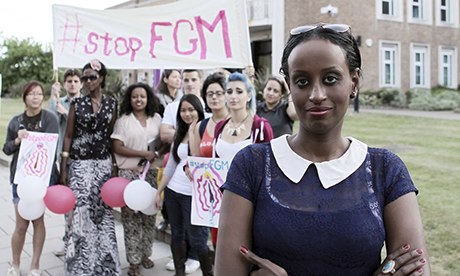
'I heard really painful screaming, I knew it was my sister." Leyla Hussein has been campaigning against female genital mutilation since 2008, winning a Cosmopolitan award for her work in 2010. "I felt every single cut, pull, stitching. I was screaming so much I just blacked out." She has a devastating way of expressing herself, clear, practical and vivid. All the way through The Cruel Cut (Channel 4), in which she gets her message across any way she can, you can see the people she is talking to crossing their legs and wincing. There's a massive scale model of a plasticine vagina, vagina cupcakes, a counter-intuitive stunt, embroidered vaginas on fete decorations; so many means, verbal and visual, by which she takes her message to the world, and yet nothing that I heard matched the power of her simply talking to the camera. Her authenticity, passion, experience, charisma all combined to get this issue off the bottom rung of the doctor's-surgery leaflets and into one's psyche as the horror show that it is. It is a lastingly powerful piece of work, and that's the most important thing to be said about it.
On a lesser note, though, the structure of the programme, its weird segues and silly stunts, often made me think, "Hang on, would you ask Simon Schama to do that?" Would anyone ask Lucy Worsley to pitch a tent in the shape of a severed neck to arouse punter interest in the plight of Anne Boleyn? Is it so inconceivable to film Hussein in conversation with her friends, also mainly the victims of FGM, without showing which deep-fried snacks she served them and how they were made? It was as if someone had decided that the documentary element was too heavy, and levened the mix with a bit of Come Dine With Me.
Another caper saw Hussein demonstrate the perils of political correctness by asking people on a high street to sign a petition in favour of FGM, on the basis that it "keeps us clean, it keeps me pure" (19 people did and only one refused). She was terrifically upset at the end of it, in tears, saying: "I can't believe people would sign this petition." And that makes a sound point about the relativism in gender politics now, where all the people who should naturally be defending women against the barbarism committed in the name of purity are instead looking the other way, fearful of an accidental alliance with Richard "When did you last see a poppy on a burqa?" Littlejohn. Hussein is right; what a shocking waste of "cultural sensitivity", for it to be used as a cover for avoidance, the genuine disregard for the suffering of other cultures. And yet, at the same time, Hussein is a psychoanalyst and activist, a clear thinker and clearer speaker; she could have articulated all that for herself, without having to muck about with a clipboard and cry afterwards and basically re-enact a Chris Morris sketch, without the pay-off.
And yet there were many more voices than I have ever seen collected on the subject, from the women who have made it their lives' work to campaign against FGM, in the face of a national squeamishness that acts on progress like molasses, to the men who think that to mutilate a girl "keeps her calm, rather than being a supermarket that is open to everyone". The baldness and brevity of that statement – wherein female purity is inseparable from reserve, and to be engaged in the world is the same as being on the open market – is something Hussein seems able to turn on in people, like a tap. She is a real talent, and no amount of stunts can mask it.
While we're in the region, One Born Every Minute has made a shameless attempt to wring more golden eggs out of its unexpected goose, with One Born: What Happened Next? (More4). I can tell you exactly what happened; they took their babies home, and they all grew a bit older, and the parents got a bit ratty with one another, and the poor narrator was delivered of observations so banal that, if you could see his face, I think he would probably be crying ("Little Maxwell had already progressed from two legs to four wheels"; "She loves dolls and princesses and playing with her sister"). It's like a flashback episode of Friends, all old gags and nothing knitting it together. Except, of course, that it is all interleaved with the moments they gave birth. For some reason, this never gets stale.

